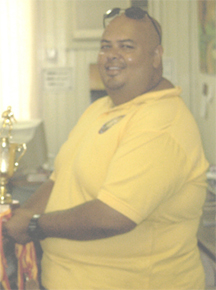By Iva Wharton
The Guyana Rugby Football Union (GRFU) continues to face an uphill battle to attract females in large numbers to the sport.
Troy Yhip, GRFU’s Youth and Development Officer in an interview with Stabroek Sport, said that despite an ongoing schools’ programme, the GRFU was still unable to attract females in large numbers.

“It’s a slow process to get girls to come out and play but they are coming out. At the Saturday programme we have a regular crew of about 15-16 girls that come out,” said Yhip.
He added that himself and other coaches had made the effort to go into schools to recruit girls but many were not interested in the sport for fear of being injured or simply because of no cooperation from school officials.
“Its’ hard to get teachers to go around with you much less find teachers who are sports oriented. Normally, I would have to go around myself and beg them to come out, get them involved in playing touch rugby, explain to them what the game is about.
“You even have to call some of these kids’ parents to explain that it does not involve tackling. What we are teaching them is the basics of tag rugby and it is not dangerous.”
Yhip argued that had the education system catered for physical education, then it would not have been difficult to attract students particularly females to the sport.
“It’s not like before when Physical Education was a part of the curriculum. Now, as soon as a child gets to High School is about the books more than sports. As soon as some parents learn that their children are into sports, they pull them out. So is hard not to get females and this is not just limited to rugby.”
Yhip said that if the sport of rugby was to attract the sizeable amount of sponsorship like that of Digicel or Pepsi schools football, then there would a different outlook to the sport.
“You see a number of females turning up for the Pepsi female football we would like to get that for rugby. These kids like to know what they are getting in return when you are recruiting them. So is not an easy job recruiting females. They want to know what is there for them or what competitions they will be playing.”
Asked when this current crop of senior females move off, if there would be replacements to replenish the female team, Yhip answered in the affirmative stating that he was currently working with a crop of girls who will surely move onto to playing under-19 rugby and then seniors. But that he said will not be until another three to four more years as the players have not yet attained the age of 16.
Yhip said the programme that that was developed by the GRFU was not one that just caters to rugby, but the holistic development of a player explaining that that involves their academic and social development.
“You need to have a relationship with some of the parents, because of the parents would call complaining that their children are not doing well at school. So as the Youth Development Officer I have to speak with them, find out what is bothering them, how I can help and then brief the parents.”
Many parents he said are usually grateful for the attention being paid to the development of their children.
A lot of attention is placed on the attitude of the players among their teammates or with their teachers or parents. That he said is to ensure that the girls are well rounded individuals.
Yhip said since the programme started, he has been working with four schools: St John’s College, Marian Academy, Coven Garden Secondary and North Georgetown Secondary. Queen’s College he said was also on the list of schools he was working with, but said it was very difficult recruiting females.
He however said that with more emphasis placed on the development of youth rugby from the union’s perspective and a well structured physical education programme in schools, then the numbers coming out.
The GFFU this past year, said Yhip, was focused on the development of the senior team which somewhat took away from the development at the junior level.




